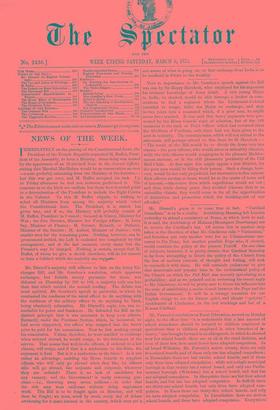Next in importance to Mr. Goschen's speech against the Bill
was one by Sir Henry Havelock, who employed for his argument his intimate knowledge of Army detail. A rich young Major in India, he showed, would be able through a broker in com- missions to find a regiment where the Lieutenant-Colonel intended to resign, bribe the Major to exchange, and step in two years into a command which, if a poor man, he might never have reached. It was said that heavy payments were pre- vented by the Horse Guards' right of selection, but of the 149 vacancies in the rank of Field Officer which had occurred since the Abolition of Purchase, only three had not been given to the next in seniority. The constituencies, which will not attend to the statesman, will perhaps attend to this from Sir H. Havelock :- " The result of the Bill would be to divide the Army into two classes,—the poor officers, who would serve in unhealthy climates, while the rich officers would congregate in the pleasant Mediter- ranean stations, or in the still pleasanter proximity of the Pall Mall Clubs. At first sight this might appear a just division, fcir the poor men would be filling their purses. Such a change, how- ever, would be not only prejudicial, but destructive to free careers. Rich officers serving at home would be at the centre of news and of interest,—the centre from which expeditions would set out ; and thus, while during peace they avoided irksome duty in an unhealthy climate, they would come in for all the opportunities of distinction and promotion which the breaking-out of war afforded."


































